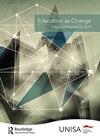工程数学中的轮廓、性能和语言
IF 1
4区 教育学
Q3 EDUCATION & EDUCATIONAL RESEARCH
引用次数: 0
摘要
全球都在关注高等教育工程课程中学生的保留和成功,尤其是来自代表性不足社区的学生。工程课程的低成功率可部分归因于学生数学不及格或无法在其他工程课程中表达数学。本研究探讨了了解工科学生的学术准备与他们在大学数学中的表现之间的关系,如何指导课程改革以提高学生的成功率,受研究问题的驱动:“学生数据的分析如何有助于理解学生在微积分方面的表现?”对开普敦大学(UCT)一个扩展课程项目中的工科学生的数据进行了分析,以根据性别、家庭语言和大学招生考试表现等变量生成概况。简介与连续三门工程数学课程的表现有关。为了确定哪些变量对工程数学成绩的解释力最大,应用了相对重要性分析。没有证据表明,大学前数学成绩方面的弱点阻碍了学生在UCT的前两门工程数学课程中取得成功,至少在扩展课程计划的支持范围内是这样。在根据工程数学成绩水平(例如,不及格与一级及格)进行分析时,学术素养以及在较小程度上的定量素养在解释工程数学成绩差异方面比大学前数学具有更大的相对重要性。研究结果表明,提高工科学生成功率的干预措施应包括发展学术素养实践,可能包括在一年级和二年级的数学课程中。我们反思了学生数据的相对重要性分析是如何通过强调解释学生数学表现的最重要变量来加强其他研究中关于语言在数学中重要性的类似发现的。本文章由计算机程序翻译,如有差异,请以英文原文为准。
Profile, Performance and Language in Engineering Mathematics
There is a global concern for retention and success of students in higher education engineering programmes, in particular for students from under-represented communities. Low success in engineering programmes can be partly attributed to students failing mathematics or being unable to articulate mathematics in other engineering courses. This research explores how understanding the academic preparedness of engineering students in relation to their performance in university mathematics can direct curriculum changes to improve student success, driven by the research question: “How can the analysis of student data contribute to understanding student performance in calculus?” Data from engineering students in an extended curriculum programme at the University of Cape Town (UCT) were analysed to generate profiles from variables including gender, home language and performance in university admissions tests. Profiles were related to performance in three consecutive engineering mathematics courses. To determine which variables had the greatest explanatory power on engineering mathematics scores, relative importance analysis was applied. There was no evidence that weaknesses in terms of pre-university mathematics performance held students back from succeeding in the first two engineering mathematics courses at UCT, at least within the support context of the extended curriculum programme. When analysing according to engineering mathematics performance levels (e.g., fail versus first-class pass), academic literacy and, to a lesser extent, quantitative literacy emerged as having greater relative importance than pre-university mathematics in explaining the variance in engineering mathematics scores. The findings imply that interventions to improve the success of engineering students should include developing academic literacy practices, potentially in first- and second-year mathematics courses. We reflect on how the relative importance analysis of student data strengthens similar findings from other research on the importance of language in mathematics by highlighting the most important variables explaining students’ mathematics performance.
求助全文
通过发布文献求助,成功后即可免费获取论文全文。
去求助
来源期刊

Education As Change
EDUCATION & EDUCATIONAL RESEARCH-
CiteScore
1.40
自引率
0.00%
发文量
29
审稿时长
24 weeks
期刊介绍:
Education as Change is an accredited, peer reviewed scholarly online journal that publishes original articles reflecting critically on issues of equality in education and on the ways in which educational practices contribute to transformation in non-formal, formal and informal contexts. Critique, mainly understood in the tradition of critical pedagogies, is a constructive process which contributes towards a better world. Contributions from and about marginalised communities and from different knowledge traditions are encouraged. The articles could draw on any rigorous research methodology, as well as transdisciplinary approaches. Research of a very specialised or technical nature should be framed within relevant discourses. While specialised kinds of research are encouraged, authors are expected to write for a broader audience of educational researchers and practitioners without losing conceptual and theoretical depth and rigour. All sectors of education are covered in the journal. These include primary, secondary and tertiary education, adult education, worker education, educational policy and teacher education.
 求助内容:
求助内容: 应助结果提醒方式:
应助结果提醒方式:


